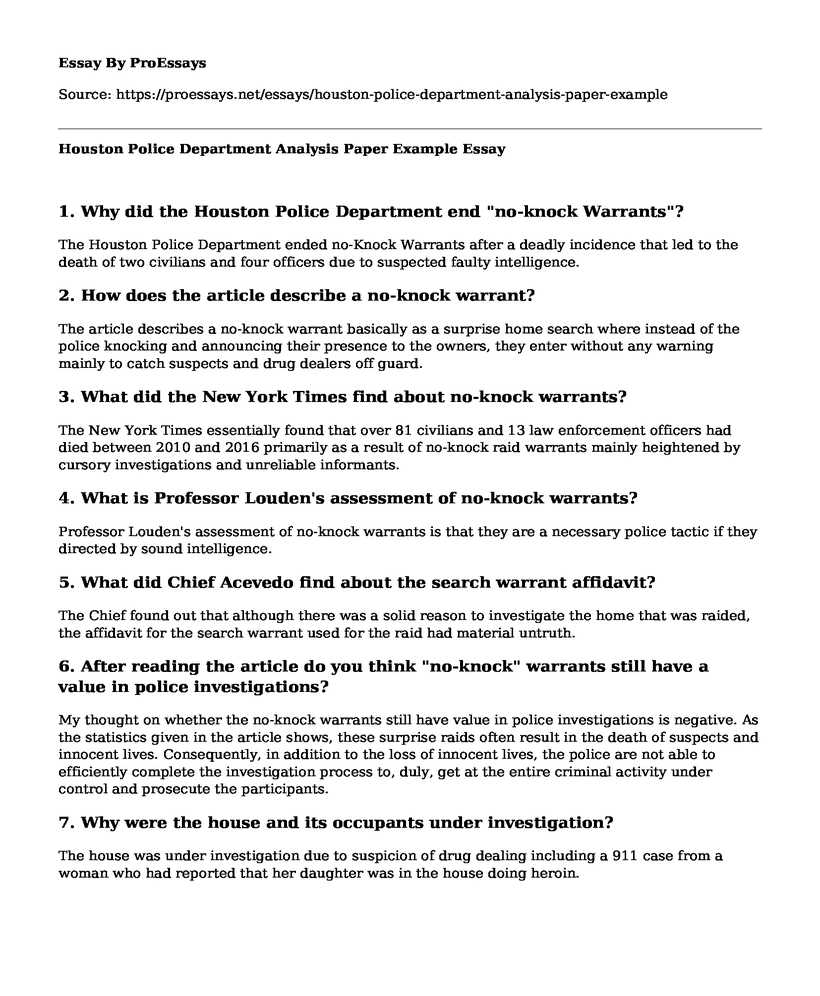1. Why did the Houston Police Department end "no-knock Warrants"?
The Houston Police Department ended no-Knock Warrants after a deadly incidence that led to the death of two civilians and four officers due to suspected faulty intelligence.
2. How does the article describe a no-knock warrant?
The article describes a no-knock warrant basically as a surprise home search where instead of the police knocking and announcing their presence to the owners, they enter without any warning mainly to catch suspects and drug dealers off guard.
3. What did the New York Times find about no-knock warrants?
The New York Times essentially found that over 81 civilians and 13 law enforcement officers had died between 2010 and 2016 primarily as a result of no-knock raid warrants mainly heightened by cursory investigations and unreliable informants.
4. What is Professor Louden's assessment of no-knock warrants?
Professor Louden's assessment of no-knock warrants is that they are a necessary police tactic if they directed by sound intelligence.
5. What did Chief Acevedo find about the search warrant affidavit?
The Chief found out that although there was a solid reason to investigate the home that was raided, the affidavit for the search warrant used for the raid had material untruth.
6. After reading the article do you think "no-knock" warrants still have a value in police investigations?
My thought on whether the no-knock warrants still have value in police investigations is negative. As the statistics given in the article shows, these surprise raids often result in the death of suspects and innocent lives. Consequently, in addition to the loss of innocent lives, the police are not able to efficiently complete the investigation process to, duly, get at the entire criminal activity under control and prosecute the participants.
7. Why were the house and its occupants under investigation?
The house was under investigation due to suspicion of drug dealing including a 911 case from a woman who had reported that her daughter was in the house doing heroin.
8. What did officer Goines do that created a cloud over the incident?
What created the cloud over the incident is the suspicion that officer Goines had lied about using a confidential informant in preparation of an affidavit for a search warrant that led to the raid.
9. What was the reaction of the informants Goines stated he used to procure the warrant?
The confidential informants, officer Goines, claimed to have worked with on that particular operation denied his assertions.
10 Would you consider what Officer Goines did unethical and what punishment would be appropriate? Explain your answer.
Although officer Goines has not been found guilty in a court of law, the actual act of lying in order to obtain a warrant for a home search does not only infringe the privacy of the occupants but also it exposes them to harm that may emanate from the forceful raid thus unethical. Consequently, a fair punishment would be a layoff since the action goes against the primary duty of an officer, which is to protect the citizens.
References
Mervosh, S. (2019). Houston Officer Lied About Confidential Informant in Deadly Drug Operation, Chief Says. Retrieved from https://www.nytimes.com/2019/02/16/us/houston-police-gerald-goines.html?module=inline%20(Links%20to%20an%20external%20site.)Links%20to%20an%20external%20site.
Zaveri, M. (2019). Houston Police to End Use of 'No-Knock' Warrants After Deadly Drug Raid. Retrieved from https://www.nytimes.com/2019/02/19/us/no-knock-warrant-houston-police.html
Cite this page
Houston Police Department Analysis Paper Example. (2022, Dec 06). Retrieved from https://proessays.net/essays/houston-police-department-analysis-paper-example
If you are the original author of this essay and no longer wish to have it published on the ProEssays website, please click below to request its removal:
- Evaluating the Professionalization of Real Estate Agents Paper Example
- Evaluating the Professionalism of Real Estate Agents Paper Example
- Essay Sample on Ethical Code in Police Profession
- Positioning: Create a Distinct Image for Your Brand - Essay Sample
- Paper Example on Emergency Services: Firefighting & Helpline 999
- Rise in Motor Vehicles: Impact on Air Pollution and Environment - Essay Sample
- Paper on Police Undercover Unit Struggles with Stress: A Case Study







